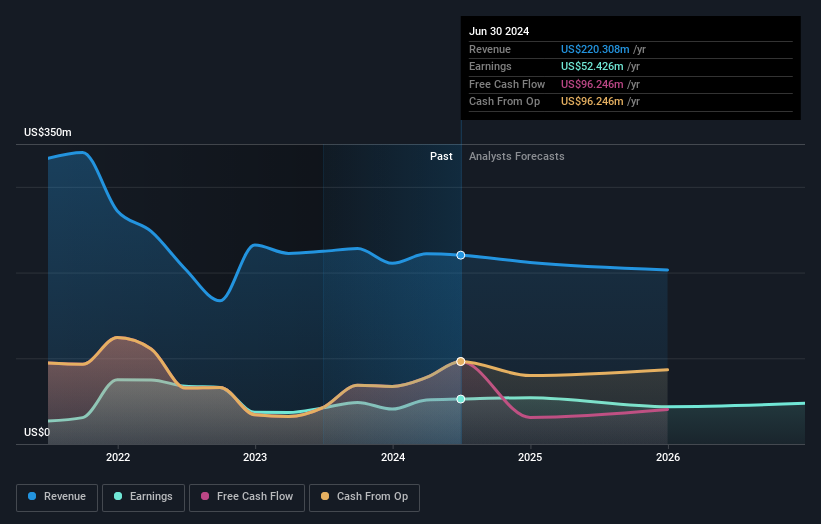- United States
- /
- REITS
- /
- NYSE:ALEX
Even after rising 3.6% this past week, Alexander & Baldwin (NYSE:ALEX) shareholders are still down 5.1% over the past five years

While not a mind-blowing move, it is good to see that the Alexander & Baldwin, Inc. (NYSE:ALEX) share price has gained 20% in the last three months. But if you look at the last five years the returns have not been good. In fact, the share price is down 21%, which falls well short of the return you could get by buying an index fund.
While the last five years has been tough for Alexander & Baldwin shareholders, this past week has shown signs of promise. So let's look at the longer term fundamentals and see if they've been the driver of the negative returns.
View our latest analysis for Alexander & Baldwin
While markets are a powerful pricing mechanism, share prices reflect investor sentiment, not just underlying business performance. One way to examine how market sentiment has changed over time is to look at the interaction between a company's share price and its earnings per share (EPS).
Alexander & Baldwin became profitable within the last five years. Most would consider that to be a good thing, so it's counter-intuitive to see the share price declining. Other metrics might give us a better handle on how its value is changing over time.
We note that the dividend has remained healthy, so that wouldn't really explain the share price drop. However, revenue has declined at a compound annual rate of 22% per year. With revenue weak, and increased payouts of cash, the market might be taking the view that its best days are behind it.
The graphic below depicts how earnings and revenue have changed over time (unveil the exact values by clicking on the image).

We know that Alexander & Baldwin has improved its bottom line lately, but what does the future have in store? So we recommend checking out this free report showing consensus forecasts
What About Dividends?
It is important to consider the total shareholder return, as well as the share price return, for any given stock. The TSR incorporates the value of any spin-offs or discounted capital raisings, along with any dividends, based on the assumption that the dividends are reinvested. Arguably, the TSR gives a more comprehensive picture of the return generated by a stock. We note that for Alexander & Baldwin the TSR over the last 5 years was -5.1%, which is better than the share price return mentioned above. This is largely a result of its dividend payments!
A Different Perspective
Alexander & Baldwin provided a TSR of 19% over the last twelve months. Unfortunately this falls short of the market return. But at least that's still a gain! Over five years the TSR has been a reduction of 1.0% per year, over five years. So this might be a sign the business has turned its fortunes around. I find it very interesting to look at share price over the long term as a proxy for business performance. But to truly gain insight, we need to consider other information, too. Take risks, for example - Alexander & Baldwin has 3 warning signs (and 1 which shouldn't be ignored) we think you should know about.
For those who like to find winning investments this free list of undervalued companies with recent insider purchasing, could be just the ticket.
Please note, the market returns quoted in this article reflect the market weighted average returns of stocks that currently trade on American exchanges.
New: Manage All Your Stock Portfolios in One Place
We've created the ultimate portfolio companion for stock investors, and it's free.
• Connect an unlimited number of Portfolios and see your total in one currency
• Be alerted to new Warning Signs or Risks via email or mobile
• Track the Fair Value of your stocks
Have feedback on this article? Concerned about the content? Get in touch with us directly. Alternatively, email editorial-team (at) simplywallst.com.
This article by Simply Wall St is general in nature. We provide commentary based on historical data and analyst forecasts only using an unbiased methodology and our articles are not intended to be financial advice. It does not constitute a recommendation to buy or sell any stock, and does not take account of your objectives, or your financial situation. We aim to bring you long-term focused analysis driven by fundamental data. Note that our analysis may not factor in the latest price-sensitive company announcements or qualitative material. Simply Wall St has no position in any stocks mentioned.
About NYSE:ALEX
Alexander & Baldwin
Alexander & Baldwin, Inc. (NYSE: ALEX) (A&B) is the only publicly-traded real estate investment trust to focus exclusively on Hawai'i commercial real estate and is the state's largest owner of grocery-anchored, neighborhood shopping centers.
Established dividend payer with proven track record.

